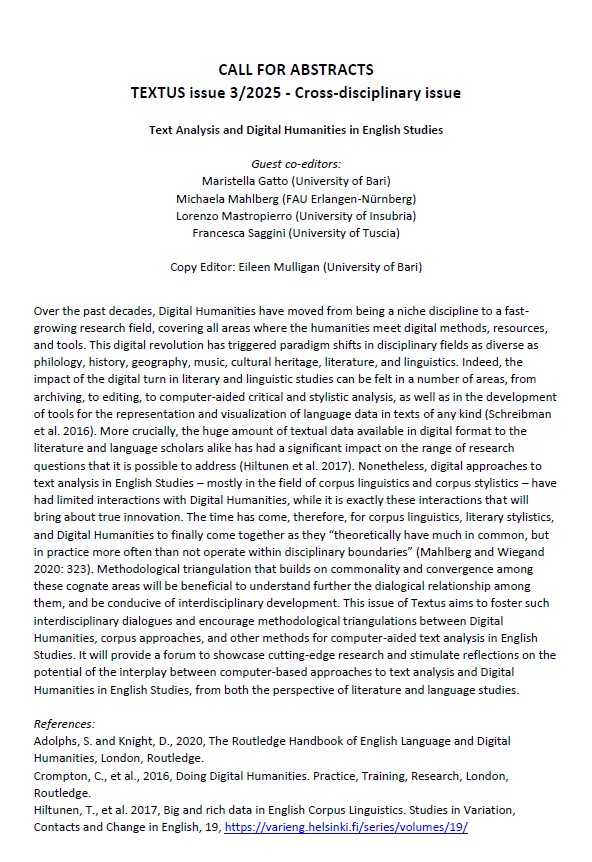Call for abstracts – Textus issue 3/2025 – Cross-disciplinary issue – “Text Analysis and Digital Humanities in English Studies”
Call for abstracts Textus issue 3/2025 – Cross-disciplinary issue Text Analysis and Digital Humanities in English Studies Guest co-editors: Maristella Gatto (University of Bari) Michaela Mahlberg (University of Birmingham) Lorenzo Mastropierro (University of Insubria) Francesca Saggini (University of Tuscia) Copy Editor: Eileen Mulligan (University of Bari) Over the past decades, Digital Humanities have moved from being a niche discipline to a fast-growing research field, covering all areas where the humanities meet digital methods, resources, and tools. This digital revolution has triggered paradigm shifts in disciplinary fields as diverse as philology, history, geography, music, cultural heritage, literature, and linguistics. Indeed, the impact of the digital turn in literary and linguistic studies can be felt in a number of areas, from archiving, to editing, to computer-aided critical and stylistic analysis, as well as in the development of tools for the representation and visualization of language data in texts of any kind (Schreibman et al. 2016). More crucially, the huge amount of textual data available in digital format to the literature and language scholars alike has had a significant impact on the range of research questions that it is possible to address (Hiltunen et al. 2017). Nonetheless, digital approaches to text analysis in English Studies – mostly in the field of corpus linguistics and corpus stylistics – have had limited interactions with Digital Humanities, while it is exactly these interactions that will bring about true innovation. The time has come, therefore, for corpus linguistics, literary stylistics, and Digital Humanities to finally come together as they “theoretically have much in common, but in practice more often than not operate within disciplinary boundaries” (Mahlberg and Wiegand 2020: 323). Methodological triangulation that builds on commonality and convergence among these cognate areas will be beneficial to understand further the dialogical relationship among them, and be conducive of interdisciplinary development. This issue of Textus aims to foster such interdisciplinary dialogues and encourage methodological triangulations between Digital Humanities, corpus approaches, and other methods for computer-aided text analysis in English Studies. It will provide a forum to showcase cutting-edge research and stimulate reflections on the potential of the interplay between computer-based approaches to text analysis and Digital Humanities in English Studies, from both the perspective of literature and language studies. References: Adolphs, S. and Knight, D., 2020, The Routledge Handbook of English Language and Digital Humanities, London, Routledge. Crompton, C., et al., 2016, Doing Digital Humanities. Practice, Training, Research, London, Routledge. Hiltunen, T., et al. 2017, Big and rich data in English Corpus Linguistics. Studies in Variation, Contacts and Change in English, 19, https://varieng.helsinki.fi/series/volumes/19/ Maci, S. and Sala, M., 2022, Corpus Linguistics and Translation Tools for Digital Humanities: Research Methods and Applications, London, Routledge. Mahlberg, M. 2013, Corpus Stylistics and Dickens’s Fiction, London, Routledge. Mahlberg, M. and Wiegand, V., 2020, “Literary Stylistics”, in Adolphs S. et al. (eds.), The Routledge Handbook of English Language and Digital Humanities, pp. 321-345, London, Routledge. Martin, P. E. 2022, The Digital Humanities and Literary Studies, Oxford, Oxford University Press. Underwood, T., 2019, Distant Horizons. Digital Evidence and Literary Change, Chicago, Chicago University Press. Submission of abstracts Please send abstracts to: maristella.gatto@uniba.it, m.a.mahlberg@bham.ac.uk, lorenzo.mastropierro@uninsubria.it, fsaggini@unitus.it Timeline Deadline for abstracts submission (400 words plus references): 15 December 2024. Please put as subject line “Textus Cross-disciplinary Issue 3/2025 – abstract submission” Notification to authors: 15 January 2025 Deadline for submission of first draft of article (maximum 7500 words including references): 31 May 2025 Request for revisions following peer review: 15 July 2025 Deadline for final version of article: 1 September 2025

